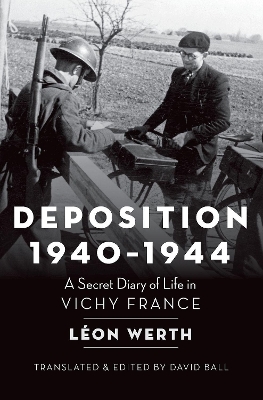
Deposition, 1940-1944
A Secret Diary of Life in Vichy France
Seiten
2018
Oxford University Press Inc (Verlag)
978-0-19-049954-9 (ISBN)
Oxford University Press Inc (Verlag)
978-0-19-049954-9 (ISBN)
This diary is one of the most precious--and readable--pieces of testimony about life in Vichy France under Nazi occupation. Werth was a Jewish writer who left Paris in June 1940 and hid out in a small village. We see how the Occupation affected life in the countryside and finally, the Paris insurrection of August 1944.
Historians agree: the diary of Léon Werth (1878-1955) is one of the most precious--and readable--pieces of testimony ever written about life in France under Nazi occupation and the Vichy regime. Werth was a free-spirited, unclassifiable writer, the author of eleven novels, art and dance criticism, acerbic political reporting, and memorable personal essays. He was Jewish, and left Paris in June 1940 to hide out in his wife's country house in Saint-Amour, a small village in the Jura Mountains: his short memoir, 33 Days recounts his struggle to get there. Deposition tells of daily life in the village, on nearby farms and towns, and finally back in Paris, where he draws the portrait of a Resistance network in his apartment and writes an eyewitness report of the insurrection that freed the city in August, 1944.
From Saint-Amour, we see both the Resistance in the countryside, derailing troop trains, punishing notorious collaborators--and growing repression: arrests, torture, deportation, and executions. Above all, we see how Vichy and the Occupation affect the lives of farmers and villagers and how their often contradictory attitudes evolve from 1940-1944. Werth's ear for dialogue and novelist's gift for creating characters animate the diary: in the markets and in town, we meet real French peasants and shopkeepers, railroad men and the patronne of the café at the station, schoolteachers and gendarmes. They come off the page alive, and the countryside and villages come alive with them.
With biting irony, Werth records, almost daily, what Vichy-German propaganda was saying on the radio and in the press. And we follow the progress of the war as people did then, day by day. These entries make interesting, often amusing reading, a stark contrast with his gripping entries on the persecution and deportation of the Jews. Deposition is a varied, complex, piece of living history, and a pleasure to read.
Historians agree: the diary of Léon Werth (1878-1955) is one of the most precious--and readable--pieces of testimony ever written about life in France under Nazi occupation and the Vichy regime. Werth was a free-spirited, unclassifiable writer, the author of eleven novels, art and dance criticism, acerbic political reporting, and memorable personal essays. He was Jewish, and left Paris in June 1940 to hide out in his wife's country house in Saint-Amour, a small village in the Jura Mountains: his short memoir, 33 Days recounts his struggle to get there. Deposition tells of daily life in the village, on nearby farms and towns, and finally back in Paris, where he draws the portrait of a Resistance network in his apartment and writes an eyewitness report of the insurrection that freed the city in August, 1944.
From Saint-Amour, we see both the Resistance in the countryside, derailing troop trains, punishing notorious collaborators--and growing repression: arrests, torture, deportation, and executions. Above all, we see how Vichy and the Occupation affect the lives of farmers and villagers and how their often contradictory attitudes evolve from 1940-1944. Werth's ear for dialogue and novelist's gift for creating characters animate the diary: in the markets and in town, we meet real French peasants and shopkeepers, railroad men and the patronne of the café at the station, schoolteachers and gendarmes. They come off the page alive, and the countryside and villages come alive with them.
With biting irony, Werth records, almost daily, what Vichy-German propaganda was saying on the radio and in the press. And we follow the progress of the war as people did then, day by day. These entries make interesting, often amusing reading, a stark contrast with his gripping entries on the persecution and deportation of the Jews. Deposition is a varied, complex, piece of living history, and a pleasure to read.
Léon Werth (1878-1955) was a prominent French-Jewish writer, art critic, and close friend to Antoine de Saint-Exupéry . A prominent commentator on French society during both World Wars, Werth spent the years of the Second World War in hiding from the Nazis, composing Déposition. About the translator: David Ball is Professor Emeritus of French and Comparative Literature, Smith College. His translations include the Henri Michaux anthology, winner of the MLA's prize for literary translation, and Diary of the Dark Years, 1940-1944, winner of French-American Foundation Translation Prize for Nonfiction.
AcknowledgmentsTranslator's IntroductionJean-Pierre Azéma's IntroductionLucien Febvre's IntroductionPreface19401941194219431944Appendix
| Erscheinungsdatum | 06.05.2018 |
|---|---|
| Übersetzer | David Ball |
| Zusatzinfo | 12 |
| Verlagsort | New York |
| Sprache | englisch |
| Maße | 236 x 163 mm |
| Gewicht | 590 g |
| Themenwelt | Literatur ► Biografien / Erfahrungsberichte |
| Literatur ► Essays / Feuilleton | |
| Geschichte ► Allgemeine Geschichte ► Neuzeit (bis 1918) | |
| Geschichte ► Allgemeine Geschichte ► 1918 bis 1945 | |
| Geschichte ► Teilgebiete der Geschichte ► Militärgeschichte | |
| ISBN-10 | 0-19-049954-0 / 0190499540 |
| ISBN-13 | 978-0-19-049954-9 / 9780190499549 |
| Zustand | Neuware |
| Informationen gemäß Produktsicherheitsverordnung (GPSR) | |
| Haben Sie eine Frage zum Produkt? |
Mehr entdecken
aus dem Bereich
aus dem Bereich
Giordano Bruno - ein ketzerisches Leben
Buch | Hardcover (2024)
C.H.Beck (Verlag)
CHF 41,85
das dramatische 16. Jahrhundert
Buch | Hardcover (2024)
Rowohlt Berlin (Verlag)
CHF 47,60
Kunst und Gesellschaft an der Schwelle zur globalen Welt
Buch | Hardcover (2024)
Klett-Cotta (Verlag)
CHF 56,90


